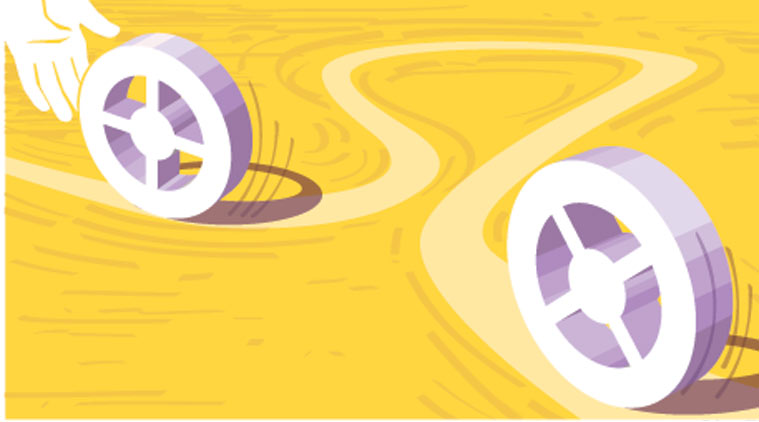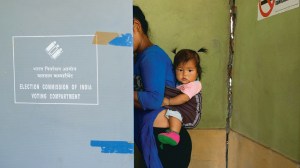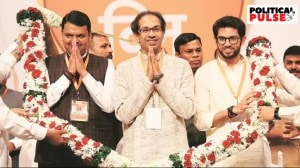- India
- International
The good fight
With a commitment to empowering the citizen and fighting graft, Narendra Modi carries forward Atal Bihari Vajpayee’s vision for governance
 Like Vajpayee, Modi believes in democracy; those who govern are not rulers, they are servants.
Like Vajpayee, Modi believes in democracy; those who govern are not rulers, they are servants.
“What road should I go down? Honour lost at busy crossroads, knights defeated by pawns: Do I make my final move, or do I withdraw from battle?” These are some thoughts expressed by former Prime Minister Atal Bihari Vajpayee in his poem Raah kaunsi jaaun main. When a person chooses difficult terrain, one should be prepared to face hurdles, even turbulence. Occasionally, travellers land in a dilemma about going ahead, braving the odds, or beating a retreat. Those who lack courage would prefer to step back at the first hurdle itself — but a leader with strong willpower forges ahead, ultimately achieving the goal.
Atal Bihari Vajpayee is one such triumphant leader. And his willpower has earned him an indelible place in the hearts of India’s people. It was no smooth journey for Atalji to reach the position of prime minister. Son of an ordinary school teacher, Vajpayee began his career as a journalist. He took part in the Quit India Movement and was arrested. He played an active role in the RSS and edited popular journals like Swadesh, Veer Arjun, Rashtra Dharma and Panchjanya, spending sleepless nights in the press bringing these out.
During Emergency, he was arrested by the Indira Gandhi government and went through a turbulent period. Yet, he didn’t lose his commitment to the masses. As president of the Bharatiya Jan Sangh, which later transformed into the BJP, he made relentless efforts to build the party from scratch. Between 1957 and 2009, Vajpayee got elected to Parliament 10 times. As minister for external affairs in the Janata government, he made his mark on India’s foreign policy. He rose to the position of PM after several struggles; even after he became PM, he faced hurdles at every step. He held the post for 13 days in his first stint, later, for 13 months; but finally, he emerged as the first non-Congress PM who governed the country for nearly five years.
During his tenure, Vajpayee gave prominence to programmes aimed at the country’s development, rather than serving petty political interests. In the shortest time, he took several important decisions that provided long-term benefits to India. Nobody can forget his contribution to the construction of national highways connecting major cities and the road connectivity to thousands of villages that helped millions travel without hassles. The “Golden Quadrilateral” and “Grameen Sadak Yojana” projects are milestones.
Vajpayee carried forward more vigorously the economic reforms introduced by P.V. Narasimha Rao. He did not hesitate to privatise public sector undertakings like VSNL. He took major development initiatives like establishing special economic zones and industrial parks, besides bringing significant changes to the information technology industry, which transformed the country’s economy. Vajpayee started the “Pravas Bharatiya Diwas” every year to attract NRIs and involve them in the country’s development. Alongside, Vajpayee introduced pro-poor schemes such as “Sampoorna Grameen Rozgar Yojana”, “Ambedkar Valmiki Basti Yojana”, providing housing for the poor, and the “National Nutrition Mission”. The “Sarva Shiksha Abhiyan” introduced by his government helped provide literacy to millions.

Within a short period of taking over as PM, Vajpayee proved India’s nuclear capabilities to the world via the Pokhran test; India then joined the club of nuclear-powered countries. Although USA, Britain and Canada tried to arm-twist India by imposing economic sanctions, they were forced to withdraw these after seeing India forge ahead in development.
Subsequently, Vajpayee took several measures to improve foreign relations. He extended a friendly hand to China to improve trade ties while taking steps to resolve border disputes through bilateral negotiations. Before Vajpayee, our relations with the US were not so strong — during the Vajpayee regime, there was a qualitative change. US President Bill Clinton came on an official tour to India after a long gap, President Jimmy Carter having visited 22 years ago. This helped restore bilateral relations in trade and strategic issues after the end of the Cold War. Several years after Vajpayee explained to the world the need to launch a war on terrorism collectively, the US realised his message’s value when it bore the brunt of 9/11 and sought India’s assistance in fighting Taliban and al Qaeda.
While launching a counter-offensive against cross-border terrorism perpetrated by Pakistan, Vajpayee extended a friendly hand too with the bus yatra to Lahore. With Vajpayee’s inspiration, Indian armed forces triumphed over the enemy in Kargil. But even after retaliating to Pakistan’s infiltration attempt, Vajpayee sought peace by holding discussions with then-Pakistan president General Musharraf. He strongly believed speedy development would be possible only if there was peace in the region. “We have been fighting with each other for the last 50 years. How long do you want to continue this fight? We are unnecessarily wasting our precious resources in wars… if we must wage war, we have to do it on unemployment, disease, poverty and backwardness,” Vajpayee said, addressing the nation from the Red Fort on August 15, 2001.
Vajpayee’s primary strength is his oratorical skill. Poetry flows through his speeches. When he got elected to the Lok Sabha for the first time in 1957, his poetic speech attracted then-Prime Minister Jawaharlal Nehru. Although Vajpayee was speaking from the last row, after the speech, Nehru hugged Vajpayee and predicted that he would become leader of the country. Nehru’s words came true.
The basic idea of good governance was put forward by Vajpayee. “Empowering the individual means empowering the nation. And empowerment is best served through rapid economic growth with rapid social change,” he said, addressing the Asia Society in New York on September 7, 2000. Commemorating his birthday on December 25, the NDA government decided to observe this day as “good governance day”.
Like Vajpayee, Prime Minister Narendra Modi also started his career as a RSS activist. One was the son of a school teacher; another, a chaiwala. It is a great virtue of Indian democracy that both could become prime ministers of this country. Both believe in the same ideology, the same goal. Modi undertook carrying forward Vajpayee’s legacy. Like Vajpayee, Modi believes in democracy; those who govern aren’t rulers, they are servants. He calls himself the people’s “pradhan sewak”, not “pradhan mantri”. For Modi, “good governance is putting people at the centre of development”.
But corruption and black money have become impediments to good governance. They have exploited the poor and snatched citizens’ rights. Hence, Modi has declared a war on these. Good governance rests on the responsibility of government to meet the needs of the people. Even the most vulnerable sections of society should have an equal stake in charting the country’s growth. It’s about transparency, efficiency and responsiveness — it’s about a clean government, free of corruption. In good governance, there is no place for favouritism, archaic methods and delays in decision-making.
As part of good governance, PM Modi outlined linking the Jan Dhan Yojana bank accounts with Aadhar cards. Direct benefits transfer, digital or electronic payments, heading towards a less cash system, are all part of good governance. The idea is to root out corruption by middlemen and facilitate convenient payments and receipts. To make people’s lives easier, the Modi government has not only repealed more than 1,000 outdated laws in Parliament, it has also simplified procedures. Earlier, a pensioner would submit a life certificate issued by the authorities. With “Jeevan Praman”, an Aadhar-based digital life certificate for pensioners, people need not submit a physical life certificate every year to ensure continuity of pension.
Modi has expanded the good governance path laid out by Vajpayee. He wants to make India strong, stable and prosperous. His priorities are villages, farmers, women, youth and antyodaya or uplifitment of the poorest. “I will not concede defeat” (haar nahi manunga) said Vajpayee in one of his poems. Taking this as an inspiration, Modi is determined to fight for the cause of the people.
EXPRESS OPINION
More Explained
Apr 20: Latest News
- 01
- 02
- 03
- 04
- 05









































